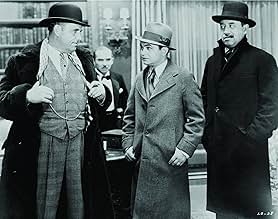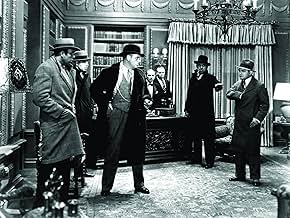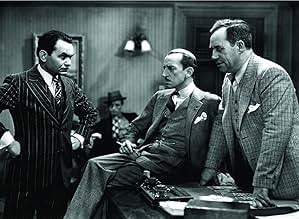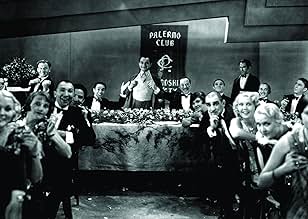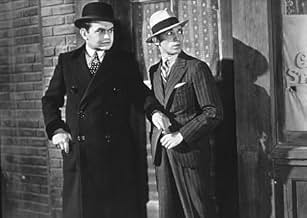IMDb RATING
7.2/10
15K
YOUR RATING
A small-time criminal moves to a big city to seek bigger fortune.A small-time criminal moves to a big city to seek bigger fortune.A small-time criminal moves to a big city to seek bigger fortune.
- Nominated for 1 Oscar
- 2 wins & 1 nomination total
Thomas E. Jackson
- Sgt. Flaherty
- (as Thomas Jackson)
Nicholas Bela
- Ritz Colonna
- (as Nick Bela)
Ernie Adams
- Cashier
- (uncredited)
Elmer Ballard
- Bat Carilla
- (uncredited)
Ferike Boros
- Mrs. Passa
- (uncredited)
Kernan Cripps
- Detective
- (uncredited)
George Daly
- Machine-Gunner
- (uncredited)
Adolph Faylauer
- New Year's Celebrant
- (uncredited)
Featured reviews
WARNING: This review may reveal some scenes of the movie!
In the film that made Edward G. Robinson a star, we get to see one of the nastiest, meanest characters ever put on film. As "Rico," Robinson plays a no-holds barred gangster. As an example, at one point he believes one of his gang is feeling guilty and going to the priest to confess...so he guns him down on the steps of the church.
I first started watching the film simply because I'm a bit of a film buff and felt that it should be a film I see, regardless of how good (or bad) it might be. But by the end of the film, I had been pulled into the story. It revolves around a small-time thug and his buddy who go to the city to make it big. Soon Rico is muscling in on the "big guys" turf, taking over his territory with his own brand of shoot first, ask questions later. I could tell you more, but you should see the movie instead.
Robinson is great in the film. Toward the end of the film there is an amazing shot of just his face, staring into the camera -- no words, no other characters, just Robinson as Rico, and you get a chance to see truly great acting! Just the mood he creates with his eyes alone in this one shot is worth seeing the entire film. Throw in a good storyline, an entire gang of thugs who are terrified of the chief thug, great direction, and you wind up with a great film. And don't worry parents -- this is still a film from 1930, so there is no sex, no language, and even the majority of the violence (which is minimal considering this is a film about the mob!) is hidden from sight. Even the ones you see have no blood involved -- just the sound of a gun and a person slumps over to die.
When you see a film like this on a station like Turner Classic Movies, you get the added benefit of additional trivia. According to the introduction, the book upon which this movie was based was written after the author, listening to a friend of his sing on the radio live from a local club, was gunned down on the air when the mob broke into the club with Tommy guns blazing. Imagine the shock of hearing your friend killed live on the radio...
Finally, during the introduction of the film it was also stated that at the time of release, complaints were made that the film glorified the mob and their violent ways. I disagree. If Robinson's portrayal doesn't turn you off of violence and the mob, then you probably aren't human -- which is probably exactly the point of this film.
In the film that made Edward G. Robinson a star, we get to see one of the nastiest, meanest characters ever put on film. As "Rico," Robinson plays a no-holds barred gangster. As an example, at one point he believes one of his gang is feeling guilty and going to the priest to confess...so he guns him down on the steps of the church.
I first started watching the film simply because I'm a bit of a film buff and felt that it should be a film I see, regardless of how good (or bad) it might be. But by the end of the film, I had been pulled into the story. It revolves around a small-time thug and his buddy who go to the city to make it big. Soon Rico is muscling in on the "big guys" turf, taking over his territory with his own brand of shoot first, ask questions later. I could tell you more, but you should see the movie instead.
Robinson is great in the film. Toward the end of the film there is an amazing shot of just his face, staring into the camera -- no words, no other characters, just Robinson as Rico, and you get a chance to see truly great acting! Just the mood he creates with his eyes alone in this one shot is worth seeing the entire film. Throw in a good storyline, an entire gang of thugs who are terrified of the chief thug, great direction, and you wind up with a great film. And don't worry parents -- this is still a film from 1930, so there is no sex, no language, and even the majority of the violence (which is minimal considering this is a film about the mob!) is hidden from sight. Even the ones you see have no blood involved -- just the sound of a gun and a person slumps over to die.
When you see a film like this on a station like Turner Classic Movies, you get the added benefit of additional trivia. According to the introduction, the book upon which this movie was based was written after the author, listening to a friend of his sing on the radio live from a local club, was gunned down on the air when the mob broke into the club with Tommy guns blazing. Imagine the shock of hearing your friend killed live on the radio...
Finally, during the introduction of the film it was also stated that at the time of release, complaints were made that the film glorified the mob and their violent ways. I disagree. If Robinson's portrayal doesn't turn you off of violence and the mob, then you probably aren't human -- which is probably exactly the point of this film.
Boy, is this gangster movie dated but Edward G. Robinson makes it so entertaining! Robinson, like James Cagney, can dominate a film. He certainly does that in this movie, and is sure fun to watch as "Enrico Bandello."
Everything about the movie, including the DVD transfer (although a lot better than the VHS) is dated-looking and sounding, but that helps make it interesting. The dialog is so passe that it's almost weird. I put on the English subtitles so I could understand everything because the slang of those days is something foreign to us nowadays. The different expressions of the day are fun to hear (and read).
The acting by the man (Thomas Jackson?) who plays the main cop is also strange, very wooden-like. He just didn't sound natural. Some of the other actors were likewise, others were fine. It was one of the early "talkies" so maybe things were still needed to be smoothed out, film-wise and acting-wise. In other words, some of the actors sounded professional and others amateurish.
The following year, James Cagney's "Public Enemy" came out and was much better, production-wise. What a big difference in the camera-work, for one. This film may not be the caliber of "Public Enemy" but it's still good and one to have in your collection.
Everything about the movie, including the DVD transfer (although a lot better than the VHS) is dated-looking and sounding, but that helps make it interesting. The dialog is so passe that it's almost weird. I put on the English subtitles so I could understand everything because the slang of those days is something foreign to us nowadays. The different expressions of the day are fun to hear (and read).
The acting by the man (Thomas Jackson?) who plays the main cop is also strange, very wooden-like. He just didn't sound natural. Some of the other actors were likewise, others were fine. It was one of the early "talkies" so maybe things were still needed to be smoothed out, film-wise and acting-wise. In other words, some of the actors sounded professional and others amateurish.
The following year, James Cagney's "Public Enemy" came out and was much better, production-wise. What a big difference in the camera-work, for one. This film may not be the caliber of "Public Enemy" but it's still good and one to have in your collection.
LITTLE CAESAR was made at a critical time in U.S. history. Prohibition was in, the depression was overwhelming, and mobsters were running rampant. I don't think the filmmakers realized it, but they have made a movie that paints the "Mafia" as glamorous and flashy. A message appears before the flick, telling the public how "we" must stop gangsters like Tom Powers (James Cagney,PUBLIC ENEMY) and Rico, (Edward G. Robinson, LITTLE CAESAR). The movie probably had youngsters and adults alike wanting to live the life of a man who had a city in his grasp, and no one who was anyone was "yellow". All seriousness aside, this blueprint of a long history of mob pictures is silly, dated, and damn watchable. You can't take your eyes off the screen.
A film with dialogue like the ultimate cliche "Go on. I'm...done for" must be a waste of time right? Not if you appreciate pre-historic cinema and the Vitaphone films of the early talkie period. Actors like the great Edward G. Robinson were born to talk and deliver lines at machine gun pace. This is what the audiences of the time were looking for. And that mug. Audiences would not see such a face on a gangster until Brando's GODFATHER. If you love GOODFELLAS, THE GODFATHER, Cagney and Bogart films, and even PULP FICTION, this is a must see. Experience an American original - the first potent "La Cosa Nostra" movie. Rat tat tat tat tat!!!
RATING: 10 of 10
A film with dialogue like the ultimate cliche "Go on. I'm...done for" must be a waste of time right? Not if you appreciate pre-historic cinema and the Vitaphone films of the early talkie period. Actors like the great Edward G. Robinson were born to talk and deliver lines at machine gun pace. This is what the audiences of the time were looking for. And that mug. Audiences would not see such a face on a gangster until Brando's GODFATHER. If you love GOODFELLAS, THE GODFATHER, Cagney and Bogart films, and even PULP FICTION, this is a must see. Experience an American original - the first potent "La Cosa Nostra" movie. Rat tat tat tat tat!!!
RATING: 10 of 10
Rico Bandello, a petty crook nicknamed LITTLE CAESAR, plots his rise to become crime boss of the Big City.
Edward G. Robinson made a tremendous impact in this star-making saga of a thoroughly detestable little man who bandies his way through society's underbelly for a short time until fate brings him his just reward. The evil spawn of a deplorable age, Rico cares for neither booze nor dames, only pure raw power. Even loyalty & friendship are weaknesses to be deplored since no one can be ultimately trusted. Robinson, with his frightening eyes and large ugly mouth, makes this human scum fascinating to watch - a cheap little monster in expensive suits, a moral nonentity with a big gun.
Douglas Fairbanks Jr does a fine job with what little the script gives him as Rico's longtime buddy; the bland nature of his performance contrasts nicely to Robinson's florid acting style. Even more compelling is Glenda Farrell in an important early role as Fairbanks' girlfriend - this talented actress would soon become one of Hollywood's premiere tough talking brassy blondes.
Stanley Fields, Sidney Blackmer & George E. Stone all deliver vivid portraits of crooks & criminals that Rico must intimidate or use. Special mention should be made of William Collier Jr who gives a touching portrayal as the mob's getaway driver who loses his nerve and attempts to go straight.
Movie mavens will recognize an unbilled Lucille La Verne as the old crone who intimidates Rico near the end of the picture.
With LITTLE CAESAR and PUBLIC ENEMY (1931) Warner Brothers established themselves as the Studio that could produce topnotch, gritty crime dramas. The reputation was well deserved and the films were appreciated by movie viewers already enthralled by the headline exploits of real life Depression desperadoes.
Edward G. Robinson made a tremendous impact in this star-making saga of a thoroughly detestable little man who bandies his way through society's underbelly for a short time until fate brings him his just reward. The evil spawn of a deplorable age, Rico cares for neither booze nor dames, only pure raw power. Even loyalty & friendship are weaknesses to be deplored since no one can be ultimately trusted. Robinson, with his frightening eyes and large ugly mouth, makes this human scum fascinating to watch - a cheap little monster in expensive suits, a moral nonentity with a big gun.
Douglas Fairbanks Jr does a fine job with what little the script gives him as Rico's longtime buddy; the bland nature of his performance contrasts nicely to Robinson's florid acting style. Even more compelling is Glenda Farrell in an important early role as Fairbanks' girlfriend - this talented actress would soon become one of Hollywood's premiere tough talking brassy blondes.
Stanley Fields, Sidney Blackmer & George E. Stone all deliver vivid portraits of crooks & criminals that Rico must intimidate or use. Special mention should be made of William Collier Jr who gives a touching portrayal as the mob's getaway driver who loses his nerve and attempts to go straight.
Movie mavens will recognize an unbilled Lucille La Verne as the old crone who intimidates Rico near the end of the picture.
With LITTLE CAESAR and PUBLIC ENEMY (1931) Warner Brothers established themselves as the Studio that could produce topnotch, gritty crime dramas. The reputation was well deserved and the films were appreciated by movie viewers already enthralled by the headline exploits of real life Depression desperadoes.
Powerful portrait of the rise and fall of a nasty mobster extraordinarily performed by Edward G Robinson . A heinous and villain hoodlum named Rico (Edward G. Robinson) moves from the country to the big town and joins Sam Vettori's gang along with his fellow Joe Massara (Clark Gable was originally considered for the part but Jack L. Warner decided that Gable's ears were too big, and the role went to Douglas Fairbanks Jr. instead) to rise up through the ranks of the city underworld . Soon he becomes the boss of the mobsters and known as Little Caesar, and gets closer to the great gangster Pete Montana (Ralph Ince) and Big Boy (Sidney Blackmer) . The character of Cesare Enrico Bandello is not, as widely believed, based on Al Capone. Instead, he is based on Salvatore "Sam" Cardinella, a violent Chicago gangster who operated in the early years of Prohibition . And the role of Joe Massara was based on actor George Raft, who was associated with Owney Madden, the man who organized the taxi racket in New York City.
The movie results to be one of the great mobsters pictures , and an expertly directed film that made Edward G Robinson a superstar . Despite the film's huge success, the book's author, W.R. Burnett, was furious that no actual Italians were cast in the film . Classic gangster movie contains top-notch performances , intense drama , thrills , fast-paced , action , and a shocking final . Magnificent Edward G Robinson in the title role as a snarling and ominous gangster . In one scene, Edward G. Robinson had to fire a pistol while facing the camera , try as he might, he was unable to keep his eyes open each time he pulled the trigger . Producer Hal B. Wallis originally auditioned Edward G. Robinson for the supporting role of Otero -played in the film by George Stone- before deciding he was perfect as Rico . Although The Doorway to Hell(1930), a gangster film released by Warner Bros. in 1930 was a big hit at the time, most sources consider Little Caesar to be the film which started a brief craze for the genre in the early 1930s. The "Forward" that now appears on the beginning of the film was added for the 1954 re-release of Little Caesar and The public enemy (1931) as a combination package.
The character Diamond Pete Montana was modeled on Jim Colosimo, who was murdered by Al Capone; and "The Big Boy" was based on corrupt politician William 'Big Bill' Thompson, Mayor of Chicago. The underworld banquet sequence was also based on a real event - a notorious party in honor of two gangsters, Charles Dion O'Bannion and Samuel J. "Nails" Morton, which received unfavorable coverage in the Chicago press. This First National Vitaphone early talking picture was well directed by Mervyn LeRoy and ready for release in December 1930, but Warner's brass felt it was not a Christmas picture , it officially debuted at the Strand Theatre in New York City on 9 January 1931. It ranked #9 on the American Film Institute's list of the 10 greatest films in the genre "Gangster" in June 2008.
The movie results to be one of the great mobsters pictures , and an expertly directed film that made Edward G Robinson a superstar . Despite the film's huge success, the book's author, W.R. Burnett, was furious that no actual Italians were cast in the film . Classic gangster movie contains top-notch performances , intense drama , thrills , fast-paced , action , and a shocking final . Magnificent Edward G Robinson in the title role as a snarling and ominous gangster . In one scene, Edward G. Robinson had to fire a pistol while facing the camera , try as he might, he was unable to keep his eyes open each time he pulled the trigger . Producer Hal B. Wallis originally auditioned Edward G. Robinson for the supporting role of Otero -played in the film by George Stone- before deciding he was perfect as Rico . Although The Doorway to Hell(1930), a gangster film released by Warner Bros. in 1930 was a big hit at the time, most sources consider Little Caesar to be the film which started a brief craze for the genre in the early 1930s. The "Forward" that now appears on the beginning of the film was added for the 1954 re-release of Little Caesar and The public enemy (1931) as a combination package.
The character Diamond Pete Montana was modeled on Jim Colosimo, who was murdered by Al Capone; and "The Big Boy" was based on corrupt politician William 'Big Bill' Thompson, Mayor of Chicago. The underworld banquet sequence was also based on a real event - a notorious party in honor of two gangsters, Charles Dion O'Bannion and Samuel J. "Nails" Morton, which received unfavorable coverage in the Chicago press. This First National Vitaphone early talking picture was well directed by Mervyn LeRoy and ready for release in December 1930, but Warner's brass felt it was not a Christmas picture , it officially debuted at the Strand Theatre in New York City on 9 January 1931. It ranked #9 on the American Film Institute's list of the 10 greatest films in the genre "Gangster" in June 2008.
Did you know
- GoofsRico is hit by the bullet sufficiently to require bandaging by Scabby, but the overcoat he was wearing has no bullet hole in it, nor is there any trace of blood in the subsequent scene in Little Arnie's office.
- Quotes
[last lines]
Caesar Enrico Bandello: Mother of Mercy! Is this the end of Rico?
- Alternate versionsIn the 1954 re-release, a foreword crawl was added, warning that the "heroes" of Little Caesar and L'ennemi public (1931) represent "a problem that sooner or later we, the public, must solve." This version is often shown on cable channels.
- ConnectionsFeatured in Hollywood: The Fabulous Era (1962)
- How long is Little Caesar?Powered by Alexa
Details
- Runtime
- 1h 19m(79 min)
- Color
Contribute to this page
Suggest an edit or add missing content



